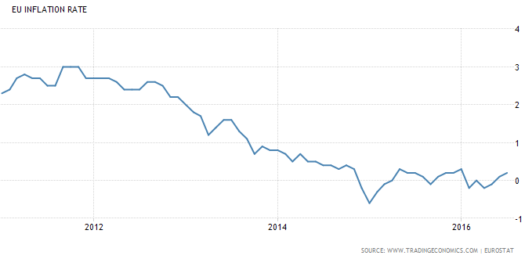In recent months there has been a rising chorus of calls for fiscal stimulus, from pundits all over the world. If I didn’t know better I’d conclude that the world’s major central banks had run out of paper and ink, and that only fiscal policy remained effective.
And then I get jolted back into the real world:
Many international investors had feared a Brexit vote would undermine the EU and hurt business and market confidence across the euro zone. But surveys point to little impact so far.
As a result, many banks are revising forecasts for further European Central Bank stimulus. JPMorgan says it no longer expects the ECB to cut rates or announce an extension of its bond-buying programme in September after solid growth data.
Well that’s a relief. For a moment there I had thought that there were other reasons why the ECB might prefer to adopt a policy of monetary stimulus:
 Seriously, I don’t think I ever recall a time when so many economists were so out of touch with what’s actually going on in the real world.
Seriously, I don’t think I ever recall a time when so many economists were so out of touch with what’s actually going on in the real world.
As usual, Paul Krugman is able to express my frustration much better than I can. Here’s what he wrote in 1999, one year after his famous 1998 liquidity trap paper that he always likes to cite, and at a time when a bunch of pundits were insisting that Japan needed fiscal stimulus:
“What continues to amaze me is this: Japan’s current strategy of massive, unsustainable deficit spending in the hopes that this will somehow generate a self-sustained recovery is currently regarded as the orthodox, sensible thing to do – even though it can be justified only by exotic stories about multiple equilibria, the sort of thing you would imagine only a professor could believe. Meanwhile further steps on monetary policy – the sort of thing you would advocate if you believed in a more conventional, boring model, one in which the problem is simply a question of the savings-investment balance – are rejected as dangerously radical and unbecoming of a dignified economy.
Will somebody please explain this to me?”
PS. For years I had wondered if I was the first to publish a paper discussing negative IOR as an option. Not surprisingly, I was not. Marvin Goodfriend of the Richmond Fed did so in 2000.